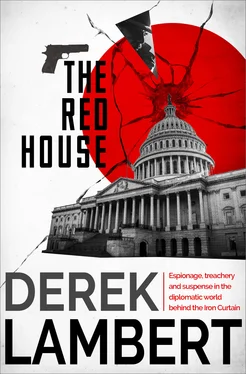‘So I am to be a spy?’
‘Far from it. Merely a specialist in judicious fraternizing. The social bear of the Soviet Embassy.’
‘An agent provocateur?’
‘A theatrical term and out-of-date. You’re hardly the type to be a masculine Mata Hari. In any case most of the spying is carried out by the lesser embassies these days. You will primarily remain a diplomat with an extension of duties which is not, after all, confined to Soviet diplomats. You will merely be our representative—or one of our representatives—in this field. You see,’ he explained, ‘we leave the heavyweight operations to the military attachés—every country does. The more devious work to our friends in other embassies. We carry out duties of a more dignified nature.’
A women’s club passed by on their way to the Monument. Brodsky’s distaste deepened to disgust.
‘Supposing I am not fitted to these duties?’ Zhukov asked.
‘We—they—feel that you are. Or rather you’re the best candidate there is in the embassy.’
Zhukov knew that it was futile to refuse. ‘And what am I supposed to do about these … these weaklings, when I meet them?’
‘Report their weaknesses to us. Determine how they can be blackmailed. Men, women, alcohol, money … every American with two cars wants three, every American with a co-op wants a town house. But,’ he added, ‘I used the term weak loosely. You may meet strong men seeking only an outlet to contribute to the glorious cause of Socialism.’ His glasses glinted in the sunlight. ‘Their strength may be their determination to supply us with information despite the risks involved.’
‘Traitors, you mean?’
The grip on Zhukov’s bicep was reapplied, unexpected strength in the delicate fingers. ‘Sometimes I am surprised by your reactions, Comrade Zhukov.’
Zhukov shrugged—it wasn’t in his character to apologize. Then inspiration came to him on this inspired morning. ‘I have a daughter in the Soviet Union, Comrade Brodsky.’
Brodsky looked surprised. ‘I am aware of that. As a matter of fact I was going to mention her …’
‘Mention Natasha? Why?’ Alarm curdled into nausea.
‘It doesn’t matter for the moment. What were you going to say?’
‘Tell me why you were going to mention Natasha?’ Sweet, innocent Natasha with her mother’s loveliness and her father’s questing spirit.
‘No, comrade, you first.’
Zhukov’s voice faltered. ‘I was merely going to ask if you thought it would be possible for her to visit us here this year.’
‘You mean as a reward for your social activities?’
‘I thought it would be a wonderful experience for her …’
‘Anything is possible,’ Brodsky said thoughtfully. ‘It could be arranged.’
‘And now, why were you going to mention her?’
‘It seems that she has been keeping bad company in Alma Ata …’ And with relish Mikhail Brodsky recounted the arrest of Natasha’s lover with the true narrator’s relish of detail. Down to the shirt and underpants.
Vladimir Zhukov sweated with self-consciousness and the effort to be suave, like a teenager dancing with a haughty girl. All the subjects in the universe available for discussion and all original comment—any comment for that matter—eluded him. He hated the setting, hated the people. He suspected that they regarded him as a curiosity, a peasant: he, the representative of the most powerful nation on earth; he an intellectual and a man of cultivated habits; he a man of forty-four staring at his drink and digging his nails into the palms of his hands like a kid of eighteen.
The diplomat sent from the cultural section presumably to keep an eye on Zhukov was getting drunk and belligerent at the bar at the end of the ballroom. He didn’t seem to be a very cultured man despite his job, and when Zhukov noticed him through the heads and drinks and diamonds he was prodding a Czech in the chest with a karate forefinger.
A baptism by fire, Brodsky had said. And it certainly was. Champagne among the Matisse still-lifes, the Sèvres nymphs and the Gobelin tapestries on French territory in Washington, followed by more drinks and dancing at the after-dinner reception on Iberian soil. He stroked the watered silk on the lapel of his tuxedo; very decadent, soft—like stroking a seal.
‘What do you think?’ The earnest and boring Rumanian with the crinkled forehead waited with anticipation.
‘I’m sure you’re right,’ Zhukov said.
‘Really? That is very surprising. Very surprising indeed.’
Zhukov wondered if he’d contradicted Soviet policy on Rumania which had become a little recalcitrant of late. Tomorrow the contradiction would be relayed and worried over all day at the Rumanian Embassy. Had Zhukov made a deliberate leak? they would ponder. Was the Kremlin going soft on Rumania—fearful of the Chinese menace, perhaps?
At that moment Zhukov didn’t care what interpretation they decided on. In the first place, he had no idea what the question had been; in the second his job was to fraternize with Westerners, not Kremlin lackeys; and in the third place his mind was slurred with the champagne and vodka he had drunk in abundance to oil his conversation. And he was desperately worried about Natasha. The message hadn’t been subtle: co-operate and produce results and Natasha can visit you; behave obstinately and she’ll be arrested like her lover.
Zhukov looked down miserably at his intense companion. How did you circulate at these functions? If you managed to dispatch a bore then you stood the risk of being isolated—an inarticulate peasant stranded among the sophisticated and effete. So he endured the Rumanian’s pleas for enlightenment a little longer; hardly listening, checking on the clip behind his black tie, wishing he’d bought patent leather shoes.
Across the room Zhukov’s watchdog, whose name was Dmitri Kalmykov, was becoming louder in his attack on the Czech; but the Czech, sustained by the new liberalism flowering like spring blossom in his country, was not cowering. He prodded back, answered with quiet contempt and infuriated the bulging, pudding-faced Russian. Interest and tension shivered in the air. A fine watchdog and instructor, Zhukov sighed to himself.
To the Rumanian he said, ‘Get me another drink.’ He was not normally a curt man but such grinding platitudes could not be endured for too long. He thrust his empty glass at the Rumanian who crinkled a little more at the injustice of it.
In the ballroom, with its walls draped with red silk and its splendid tapestries, Peter Duchin and his orchestra swung sibilantly into ‘Strangers in the Night.’ Above the music Zhukov heard Kalmykov’s voice, like an angry vocalist singing a different song.
He gazed into the crevice of two plump breasts and revived somewhat. Their owner said, ‘You’re Russian, aren’t you?’
Zhukov said he was, searching for supporting words like a badly-rehearsed actor.
She was in her mid-thirties, English, faded, but still fruity—like a pear just beginning to go soft, Zhukov decided, taking the vodka from the Rumanian and dismissing him. He tried to typecast her; but, unlike the wives of most British diplomats, she didn’t fit into any preconceived slot. The usual stifling sense of decorum and protocol hadn’t affected her, unless it had accelerated the premature bruising of vitality, removed some of the bloom from the skin.
‘I could tell,’ she said, her voice blurred by drink.
‘Is it so obvious?’
She leaned forward as if pulled by her breasts. They were firm but traced with delicate veins. ‘Of course,’ she said, ‘you are so masculine.’
Vladimir wished valiantly for the presence of Valentina; but he had been told to operate alone as much as possible—‘you appear more attractive and more vulnerable that way.’
Читать дальше












